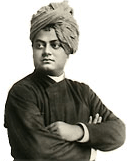| Swami Vivekananda (1863 - 1902) |
Narendranath Dutt was born into an upper-middle-class Kayastha family in Bengal. His education was in a western-style university where he was exposed to western philosophy, Christianity and science.
A believer in social reform he joined the Brahmo Samaj. This society was dedicated to eliminating child marriage and illiteracy and determined to spread education among women and the lower castes. Later on he became disciple of Ramakrishna, who demonstrated the essential unity of all religions. He was an activating force behind the Vedanta movement in the United States and England.
|
 |
In 1893 he appeared in Chicago as a spokesman for Hinduism at the World's Parliament of Religions and so captivated the assembly that a newspaper account described him as "an orator by divine right and undoubtedly the greatest figure at the Parliament." On his return to India with a small group of Western disciples in 1897, Vivekananda founded the Ramakrishna Mission at Belur Math near Calcutta. Self-perfection and service were his ideals.
He adapted and made relevant to the 20th century the very highest ideals of the vedantic religion. Although he lived only two years into that century he has left his mark and his personality behind.
|
|
| |
| Category filed under: Philosopher |
|
|